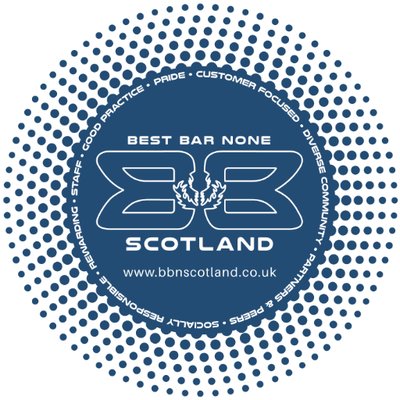Best Bar None shares 2020 top five safety tips for licensed venues
As a New Year comes around, many of us are full of hope and aspirations, planning how we can make positive changes to our lives. While personal New Year resolutions usually centre around getting fit or finding that perfect new job, businesses also need to look ahead and see where they can make improvements.
After the Christmas and New Year rush, bars and restaurants are normally a little quiet in January and February, meaning this is the perfect time for reflection. To help with this, Best Bar None Scotland is giving licensed venues a top-five New Year’s resolution list aimed at helping them to improve safety and raise standards so everyone can enjoy a safe night out throughout 2020.
1 – Review Cyber Security and secure Wi-Fi
Cyber-crime is now a real threat to the licensed trade. It’s vital that all venues are checking data, detecting attacks and making efforts to improve IT capabilities. It’s a common myth that cyber-attacks are more of a threat to larger businesses, when in-reality, an estimated 90% of attacks affect small businesses many of which are not set-up to deal with such a problem.
There are various cyber-security policies that all licensed venues need to follow, including using different passwords for accounts, don’t open any suspicious email attachments and don’t send insecure, sensitive data electronically. One of the biggest risks to the licensed trade is unsecured Wi-Fi networks. In no other sector do more people who are not employed by the venue expect to have access to the internet, and while business owners may believe they’re providing a valuable service to their customers, often poor security on these networks can lead to huge privacy issues. It’s a good idea for all venues to get some expert help, ensuring default wireless network names are changed, data is encrypted, and that your system is locked down by disabling remote administrative privileges.
2 – Cater for the sober surge
There is a definite shift in the industry to non-alcoholic drinks. Once seen as unfashionable and unnecessary, this is no longer the case as people become more health conscious and aware of what they are putting in their bodies. Likened to the now acceptance of decaf coffee, non-alcoholic beers, ciders, wine and mocktails, are now much more in demand, with big name brands such as Heineken, Peroni, Guinness and Kopparberg entering the market.
Demand for non-alcoholic alternatives is expected to soar in the coming years, as people look for the same taste but without the consequences the next day. In what is being described as a sober surge, 29% of young people in the UK now identify as non-drinkers, while there is a definite shift to ‘cutting-back’ amongst the older generation. So, the advice for venues is to try and offer non-drinkers something that can match alcohol for its complexity and flavour.
3 – Size isn’t everything
Smaller wine glass sizes in pubs and clubs can help to promote responsible consumption and contribute to positive public health.
In 2017 there was enough alcohol sold in Scotland for every adult to drink around 40 bottles of vodka, or more than 100 bottles of wine. It’s a fact that many people are not aware of how much alcohol they are consuming. A large glass of wine can contain more than three units of alcohol so it’s important that people know the smaller measure is available as they aren’t always given the option.
Best Bar None Scotland is continuing to support The Scottish Alcohol Industry Partnership’s 125ml wine measures campaign within licensed premises. The 125ml campaign is now integrated into the Best Bar None Scotland scoring booklets and assessments, with the aim to encourage venue participation, promote responsible drinking and to help reduce alcohol-related harm across Scotland.
4 – Mental health is as important as physical health
Mental health is increasingly recognised as being just as important as physical health, but there are still many ways in which we can all do better in terms of helping staff and patrons. Poor mental health at work can be the result of unresolved issues bubbling under the surface, sometimes caused by being over-worked, staff not getting on with colleagues, or problems at home.
Learning to spot the early signs of mental health problems can often stop it developing into something more serious. Some of the most common signs and symptoms include irritability, lateness and absence, lower productivity, distraction and confusion. One of the most proactive things that a manager or employer can do is to encourage regular talks between staff. This may sound very easy, but a quick and honest catch-up on how things are going can have a real impact.
Similarly, keeping an eye on your patrons, particularly your regulars, can also make a big difference. Again, keep an eye for any tell-tale signs, and encourage staff to strike up conversations with customers and ask how people are. Many pub regulars may not have a lot of people in their lives, so a simple conversation and taking an interest in their well-being can be a very powerful tool in combating loneliness.
5 – Guard against complacency when it comes to safety
Finally, if everything is going well with your business, it’s essential that you guard against complacency, particularly when it comes to safety. None of us know what is going to happen in the future, so ensuring all your safety policies and procedures are in-place and up to date is vital for all venues. This is where being a Best Bar None member can be a real benefit, as venues can use the BBN Good Practice Guide as a yearly checklist of what they need to do to keep staff and patrons safe, and provide a platform so everybody can enjoy a safe night out.
For more information visit https://www.bbnscotland.co.uk.

